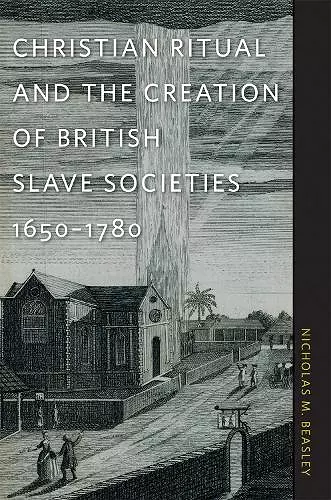Christian Ritual and the Creation of British Slave Societies, 1650–1780
Format:Paperback
Publisher:University of Georgia Press
Published:1st Oct '10
Should be back in stock very soon

This study offers a new and challenging look at Christian institutions and practices in Britain’s Caribbean and southern American colonies. Focusing on the plantation societies of Barbados, Jamaica, and South Carolina, Nicholas M. Beasley finds that the tradition of liturgical worship in these places was more vibrant and more deeply rooted in European Christianity than previously thought. In addition, Beasley argues, white colonists’ attachment to religious continuity was thoroughly racialized. Church customs, sacraments, and ceremonies were a means of regulating slavery and asserting whiteness.
Drawing on a mix of historical and anthropological methods, Beasley covers such topics as church architecture, pew seating customs, marriage, baptism, communion, and funerals. Colonists created an environment in sacred time and space that framed their rituals for maximum social impact, and they asserted privilege and power by privatizing some rituals and by meting out access to rituals to people of color. Throughout, Beasley is sensitive to how this culture of worship changed as each colony reacted to its own political, environmental, and demographic circumstances across time. Local factors influencing who partook in Christian rituals and how, when, and where these rituals took place could include the structure of the Anglican Church, which tended to be less hierarchical and centralized than at home in England; the level of tensions between Anglicans and Protestants; the persistence of African religious beliefs; and colonists’ attitudes toward free persons of color and elite slaves.
This book enriches an existing historiography that neglects the cultural power of liturgical Christianity in the early South and the British Caribbean and offers a new account of the translation of early modern English Christianity to early America.
Beasley tackles an important and mostly neglected subject and carries off his revisionist account with great flair. He joins the cutting edge of Atlantic World scholarship by looking at race in terms of interactions between blacks and whites, not by examining either group in isolation. Scholars of religion in colonial North America and the West Indies will need to reckon with this impressive book.
* Pious Persuasions: Laity and Clergy in Eighteenth-Century New England *This book is a compelling study of Episcopalian Christianity in early American slave societies. Beasley displays a deep understanding of the ways that Christian ritual practice shaped English belonging in early Barbados, Jamaica, and South Carolina, showing how religion permeated even the most brutally materialistic of human societies.
* author of The Reaper's Garden: Death and Power in the World of Atlantic Slavery *Beasley’s view of the Atlantic brings not only institutional religion but also slavery and the plantation enterprise into sharp relief in different Atlantic sites. . . . Taken together, Beasley’s work is an interesting and important contribution to the study of the religious cultures of the Atlantic World that will be useful both to scholars focused closely on the field and to those people interested more generally in the religions and cultures of the early Americas.
In this terrifically astute study of Anglicanism in South Carolina, Barbados, and Jamaica, Nicholas M. Beasley brings ritual theory to bear on rich and rewarding sources . . . Beasley's most significant contribution is his reading liturgical culture through the lens of slavery. Beasley does not reduce religious practice in a crudely functionalist way, but he makes clear that elites' religious lives served their project of crafting a slave society.
Beasley has produced a remarkable new illustration of southern liturgical culture and its adaptability to cultural, societal, and racial transformations.
ISBN: 9780820336459
Dimensions: 229mm x 152mm x 14mm
Weight: 363g
240 pages